|
|
|
Sort Order |
|
|
|
Items / Page
|
|
|
|
|
|
|
| Srl | Item |
| 1 |
ID:
092287
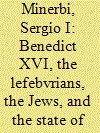

|
|
|
|
|
| Publication |
2009.
|
| Summary/Abstract |
This article explores the relations between the Catholic Church and the Jews from the middle of the previous century until the present day. It will focus on how the Catholic Church has dealt with memory of the Shoah and how this has affected the Church's relations with the Jews. It will look at the most recent developments in dialogue between the Church and the Jews under Pope Benedict XVI and the impact of his visit to Israel in May 2009.
|
|
|
|
|
|
|
|
|
|
|
|
|
|
|
|
| 2 |
ID:
119724
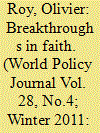

|
|
|
|
|
| Publication |
2011.
|
| Summary/Abstract |
Florence-Faith made a sudden breakthrough into contemporary global politics with the 1979 Islamic Revolution in Iran. From the Taliban to al-Qaida, the following three decades have been full of international tensions where faith was a leading factor, but this unease has by no means been restricted to the Muslim world. The Catholic Church found a new visibility under the leadership of John Paul II, shaking the communist grasp on Eastern Europe. Millions of converts from Catholicism to Protestantism are reshaping domestic politics in Brazil and other Latin America countries. Conversions from Islam to Christianity have created diplomatic hurdles in Malaysia and Afghanistan, while foreign missionary activities came under state scrutiny in India, Russia, and France. The Falun Gong sect waged an international campaign to pressure the Chinese government to remove a ban on the group. The affairs of Salman Rushdie and the Danish cartoons seemed to pit the Muslim world against the West, while the rise of Islam in Europe has raised anxieties in the United States and Israel, with the spectre of a looming Eurabia haunting urban neighborhoods and diplomatic corridors alike.
|
|
|
|
|
|
|
|
|
|
|
|
|
|
|
|
| 3 |
ID:
133107
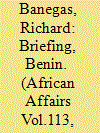

|
|
|
|
|
| Publication |
2014.
|
| Summary/Abstract |
Since 2012, political tension has threatened to undermine Benin's image as a model democracy. The President's efforts to amend the constitution to enable him to contest a third consecutive term, alongside the persecution of some of his former allies, have created a climate of political uncertainty. As a result, a wave of civic protest has gained momentum, a general strike launched in January 2014 lasted for more than four months, and the Catholic Church has broken its silence and denounced the excesses of those in power for the first time since the National Conference in 1990. This Briefing argues that these developments can be considered, on the one hand, as an extension of Benin's passive democratic revolution, a process whereby the co-option of actors from different generations and social strata - the expansion of the "politics of the belly"1 - facilitated the transition from one-party to multi-party rule. On the other hand, the highly volatile situation of the last two years could be said to mark a shift towards a more confrontational scenario of hegemonic rupture in which past agreements on how to share power are torn up by a President determined to capture all economic and political opportunities for himself.
|
|
|
|
|
|
|
|
|
|
|
|
|
|
|
|
| 4 |
ID:
104038
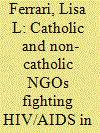

|
|
|
|
|
| Publication |
2011.
|
| Summary/Abstract |
While governments in sub-Saharan Africa work to provide in-country relief for the HIV/AIDS crisis, much health care and infrastructure comes from local or international non-governmental organizations (NGOs). The literature on NGOs suggests that collaboration increases their efficacy. Many non-Catholic NGOs do not work collaboratively with Catholic NGOs on HIV/AIDS, though the Catholic Church has rich and varied resources at its disposal for relief work. Observers often characterize the incompatibility of Catholic and non-Catholic NGOs as tactical, especially with regard to condom use. However, divergent issue framing is a critical and more fundamental distinction between the two groups. Contrasting the Catholic Church's unique spiritual frame with the scientific frame of many non-Catholic NGOs highlights the epistemological and teleological differences between the two. Reconciling these differing approaches, or finding ways to cooperate despite them, is a key element of promoting broader NGO collaboration on HIV/AIDS relief work. This theoretical analysis suggests directions for future empirical research.
|
|
|
|
|
|
|
|
|
|
|
|
|
|
|
|
| 5 |
ID:
191730
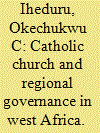

|
|
|
|
|
| Summary/Abstract |
‘Catholic regionalism’ in west Africa exemplifies the capacity of theological claims and theologically informed actors to influence regional governance and international affairs. It is driven by four mutually reinforcing factors: interfaith competition for policy influence and followership, shrinking domestic political space for civil society organizations (CSOs), and de-secularization/counter-secularization pressures (all of which have substantially diminished the church's erstwhile influence); as well as Economic Community of West African States (ECOWAS) reforms granting ‘access’ to CSOs in regional policy. Through a strategy of ‘fateful compromise’ with regional states, the church has, more than its counterparts, developed substantial capacity to influence how regional integration organizations frame and implement policy in Africa. The empirical evidence is derived from fieldwork interviews on the activities of church leaders, namely the bishops represented by the Regional Catholic Episcopal Conference of West Africa (RECOWA); the Catholic bishops’ conferences in Ghana and Nigeria, where interfaith hegemonic competition is most intense; and ECOWAS Commission bureaucrats. The article enriches the ‘new regionalism’ framework with a template to better understand the regional governance activities of Africa's faith-based actors; and contributes to the literature by introducing the concept of ‘fateful compromise’ suggesting multiple trajectories in church-state relations, contrary to the presumption of inevitable ‘elite cooptation’ of social forces as the only option for inclusive or collaborative governance in societies experiencing regression in democracy.
|
|
|
|
|
|
|
|
|
|
|
|
|
|
|
|
| 6 |
ID:
130736
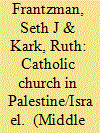

|
|
|
|
|
| Publication |
2014.
|
| Summary/Abstract |
This paper traces the history and development of Catholic real estate ownership in Palestine/Israel, uses of the properties, and the impact on the physical and cultural landscapes and on identity formation of the local population. It takes a long-term perspective, beginning with the return, after a short absence, of the Franciscans to the Holy Land in the fourteenth century and ending with the present position of the Catholic Church and the properties of its various sects and orders. It examines the history of the Catholic Church in Palestine/Israel under the Ottoman, British, Jordanian, Egyptian and Israeli regimes. In contrast to the large body of existing scholarship on the Catholic Church in the Holy Land, this examination of the local history of the Catholic Church views it through the prism of land ownership and properties. The landholdings of the Catholics are compared and contrasted with findings of previous studies by authors on those of the Greek-Orthodox and Anglican churches. Special attention is paid to the differences in frameworks, functions and geographic dispersal of the church organs, such as monasteries and educational institutions as well as the property of the local Arab Greek-Catholics. The article also examines the effect of Arabization of the Catholic clergy in relation to the lands owned by the Catholic Church and finds that, unlike other churches in the Holy Land, the Catholic Church has not generally experienced ethnic-related dissent over property.
|
|
|
|
|
|
|
|
|
|
|
|
|
|
|
|
| 7 |
ID:
120009
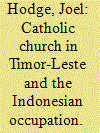

|
|
|
|
|
| Publication |
2013.
|
| Summary/Abstract |
During the Indonesian occupation of Timor-Leste (1975-99), the Roman Catholic Church grew in importance to the East Timorese people. This is demonstrated by the large increase in Timorese affiliation to the Church: 25-30% of the populace were baptized Catholics in 1975 compared with over 90% in the 1990s. Various explanations have been offered for this growth, many of which identify 'extrinsic' factors such as the religious prescriptions of Indonesian law or the pressures of Islamization. While acknowledging the importance of these factors, this paper argues that certain intrinsic factors substantially influenced the identification of the Timorese experience of occupation with Catholic faith and solidarity. An understanding of these intrinsic factors can provide a more expansive understanding of Timorese culture, experience and history. Drawing on original research into the faith and experience of Timorese people during the occupation, the author explores the relationship between suffering, resistance and the Catholic faith of the Timorese in four areas: language; 'a spirituality of resistance'; martyrdom; and sanctuary and advocacy for the persecuted. The paper draws on the insights of French philosopher and literary critic, René Girard, regarding the importance of Christianity in the context of violence. Girard has argued for a particular understanding of the centrality of the victim in human culture and of how Christianity helps to reveal this centrality. Girard's perspective sheds light on how the Timorese came to terms with their experience of suffering and violence under Indonesian occupation through their identification with Jesus Christ and the Church.
|
|
|
|
|
|
|
|
|
|
|
|
|
|
|
|
| 8 |
ID:
116489
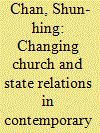

|
|
|
|
|
| Publication |
2012.
|
| Summary/Abstract |
This study examines church-state relations in Mindong diocese, Fujian province, from the perspective of state-society relations. The article seeks to identify the salient patterns of church-state relations in Mindong diocese, and the social factors that contribute to the formation of such patterns. I elaborate on the essential characteristics of the Mindong model in the paper. I argue that the three key factors affecting church-state relations in Mindong diocese are the competition between the open and underground churches, the mediating role of the Vatican, and the pragmatism of local government officials. I describe the Mindong model as a "negotiated resistance," meaning that the underground church resists the control of the government and seeks organizational autonomy through continued negotiation with officials of the government. In conclusion, I discuss the implications of this church-state model in advancing religious freedom in Chinese society.
|
|
|
|
|
|
|
|
|
|
|
|
|
|
|
|
| 9 |
ID:
148357
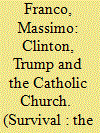

|
|
|
|
|
| Summary/Abstract |
The 2016 US presidential election was uncomfortable for the Vatican and the American bishops.
|
|
|
|
|
|
|
|
|
|
|
|
|
|
|
|
| 10 |
ID:
038622
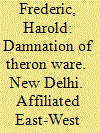

|
|
|
|
|
| Publication |
New Delhi, Affiliated East-West Press Pvt Ltd, 1976.
|
| Description |
xxiv, 355p.Hbk
|
|
|
|
|
|
|
|
|
|
|
|
Copies: C:1/I:0,R:0,Q:0
Circulation
| Accession# | Call# | Current Location | Status | Policy | Location |
| 015922 | 923.273/FRE 015922 | Main | On Shelf | General | |
|
|
|
|
| 11 |
ID:
095988
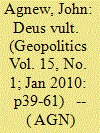

|
|
|
|
|
| Publication |
2010.
|
| Summary/Abstract |
The Catholic Church is a religious tradition with a highly centralised organisational structure which operates worldwide but that must adjust itself to and effectively operate in local and world-regional contexts that can often challenge and threaten to subvert its central doctrines, operational principles, and political compromises with secular authorities. The Church has long provided the source and model, with its base in the sacred origins of sovereignty, for a quintessentially Western statehood. In this context, I wish to raise three points for further discussion using the significant example of the Catholic Church that future research on the contemporary confluence between religion and geopolitics should address. The first is whether a church can have "geopolitics." I answer in the affirmative with a number of arguments for doing so. The second is the idea, made in writing and in his practice by Pope Benedict, that Western civilisation is in crisis and that only a restoration of a historic Christendom (Europe) based on a reinvigorated Catholic Church can save it. I dispute the strategy of "hard" or coercive power and the focus on Europe he has apparently chosen as departing from what has often best served the Church in the past. Third, and finally, in the global struggle for souls, numbers matter. Somewhat akin to the struggle for primacy between states in the modern geopolitical imagination, the struggle for souls between faiths (Catholics and Protestants, Moslems and Christians, etc.) is once more in ascendance. But doesn't this quantitative emphasis risk subverting the Church's post-Vatican II emphasis on Christian practice in everyday life? The overall purpose of the article is to introduce religious organisation and associated theological claims into the problematic of geopolitics using the case of the world's largest Christian denomination.
|
|
|
|
|
|
|
|
|
|
|
|
|
|
|
|
| 12 |
ID:
119722
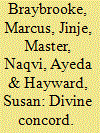

|
|
|
|
|
| Publication |
2011.
|
| Summary/Abstract |
For many, religion is more a matter of identity than of belief. The focus is on what you wear, what you eat, or whom you marry. As such, religion is seldom the primary cause of conflict but can add to hostility. You may be killed because you are uncircumcised, but not because of what you actually believe in. When conflict starts-besides caring for the injured and refugees, protecting non-combatants, counteracting propaganda, and calling for peace-there is little a religion can do.
|
|
|
|
|
|
|
|
|
|
|
|
|
|
|
|
| 13 |
ID:
181325
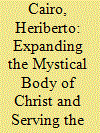

|
|
|
|
|
| Summary/Abstract |
This paper explores the geopolitical imagination of the Catholic Church, particularly in relation to the former colonies of Portugal and Spain during the late imperial period (1930–1975). At that time, authoritarian dictators with strong Catholic ideology ruled both countries. However, the relationship between the Catholic missionaries and the colonial authorities of the Iberian imperial states was not always in harmony. There were sometimes contradictions between them. The geopolitics of the Catholic Church and the colonial geopolitics of the Iberian states were convergent but not always coincident. This paper describes and analyses the Spanish and Portuguese states’ policies towards the missions. It also studies the missionary discourse in the metropolis, and its impact and reflection in the colonies.
|
|
|
|
|
|
|
|
|
|
|
|
|
|
|
|
| 14 |
ID:
034879
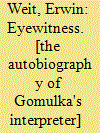

|
|
|
|
|
| Publication |
London, Andre Deutsch, 1973.
|
| Description |
224p.Hbk
|
| Standard Number |
0233957014
|
|
|
|
|
|
|
|
|
|
|
|
Copies: C:1/I:0,R:0,Q:0
Circulation
| Accession# | Call# | Current Location | Status | Policy | Location |
| 011600 | 923.2/WEI 011600 | Main | On Shelf | General | |
|
|
|
|
| 15 |
ID:
157879
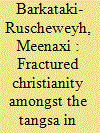

|
|
|
|
|
| Summary/Abstract |
This paper examines the proliferation of Christian denominations among the small Tangsa community in Northeast India. While resentment over the language chosen by the Baptist Church for the official Tangsa Bible triggered the initial fissures, the recent arrival of Pentecostal and charismatic churches has brought about further divisions. These divisions have not helped the cause of pan-Tangsa unity. However, in the everyday lives of most Tangsa, it is the Christian/non-Christian divide that is more relevant. Hence, the Tangsa situation is different from that of the neighbouring Mizo and Naga communities, in which Christianity has become a defining part of their identities.
|
|
|
|
|
|
|
|
|
|
|
|
|
|
|
|
| 16 |
ID:
185906
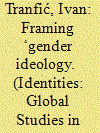

|
|
|
|
|
| Summary/Abstract |
This paper explores the role of the Catholic Church in the articulation of populist discourse. By analysing the frames in Catholic doctrines and their dissemination by the Croatian clergy, I make three contributions. Firstly, in contrast to research on the populist radical right, which demonstrates the manipulation of religion committed by secular actors, I identify the Church as an influential source and producer of the populist master frame. Secondly, I demonstrate how the bridging of the ‘gender ideology’ frame to this populist master frame allows the national Church to articulate traditionalist stances on morality policies. Thirdly, I identify the local-level argumentation strategies, empowered by frame bridging with anti-communist, nationalist, and sovereignist themes typical of radical-right populism. Focusing on religious actors’ agency allows us to improve theories rooted in the secular world of populist politics that neglect churches as important sources of populist discourse and mobilisation.
|
|
|
|
|
|
|
|
|
|
|
|
|
|
|
|
| 17 |
ID:
107951
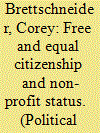

|
|
|
| 18 |
ID:
184996
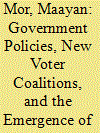

|
|
|
|
|
| Summary/Abstract |
Conventional theories of ethnic politics argue that political entrepreneurs form ethnic parties where there is ethnic diversity. Yet empirical research finds that diversity is a weak predictor for the success of ethnic parties. When does ethnicity become a major element of party competition? Scholars have explained the emergence of an ethnic dimension in party systems as the result of institutions, mass organizations, and elite initiatives. But these factors can evolve in response to an emerging ethnic coalition of voters. The author advances a new theory: ethnic cleavages emerge when voters seek to form a parliamentary opposition to government policies that create grievances along ethnic identities. The theory is tested on rare cases of government policies in Prussia between 1848 and 1874 that aggrieved Catholics but were not based on existing policies or initiated by entrepreneurs to encourage ethnic competition. Using process tracing, case comparisons, and statistical analysis of electoral returns, the author shows that Catholics voted together when aggrieved by policies, regardless of the actions of political entrepreneurs. In contrast, when policies were neutral to Catholics, the Catholic party dissolved.
|
|
|
|
|
|
|
|
|
|
|
|
|
|
|
|
| 19 |
ID:
089780
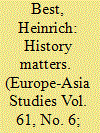

|
|
|
|
|
| Publication |
2009.
|
| Summary/Abstract |
Duscussions of Mass,Group, or Collective Identity tend to be characterised by an abundance fo theoretical and conceptual disputes and a relative lack of empirical foundation; in particular there is a lack of comparative studies based on systematic and reliable data (Bruter 2005, pp. 101-09). The dominent paradigm for both sociological and socio-psychological studies of mass identity is the constructivist approach.This emphasises, to varying degrees, the invented and constructed character of mass identity as opposed to essentialist understandings of the concept which assume a unique core or essence of identity(Scott & Marshall 2009, pp.330-33).
|
|
|
|
|
|
|
|
|
|
|
|
|
|
|
|
| 20 |
ID:
144733
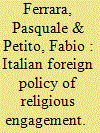

|
|
|
|
|
| Summary/Abstract |
A new awareness of the role of religion in international relations has started to inform concrete policy discussions in several Western Ministries of Foreign Affairs under the heading of ‘religious engagement’ in foreign policy. Italy is no exception, but as the country which hosts the Holy See, it represents a special case. As the approach to religion found in the historical record of Italian foreign policy shows, Italy has a comparative advantage and could well develop a unique model of religious engagement by strengthening the central structures involved in religious matters and foreign policy, as well as by using the vast network of Rome-based religious non-state actors as a forum of consultation and policy advice.
|
|
|
|
|
|
|
|
|
|
|
|
|
|
|
|
|
|
|
|
|